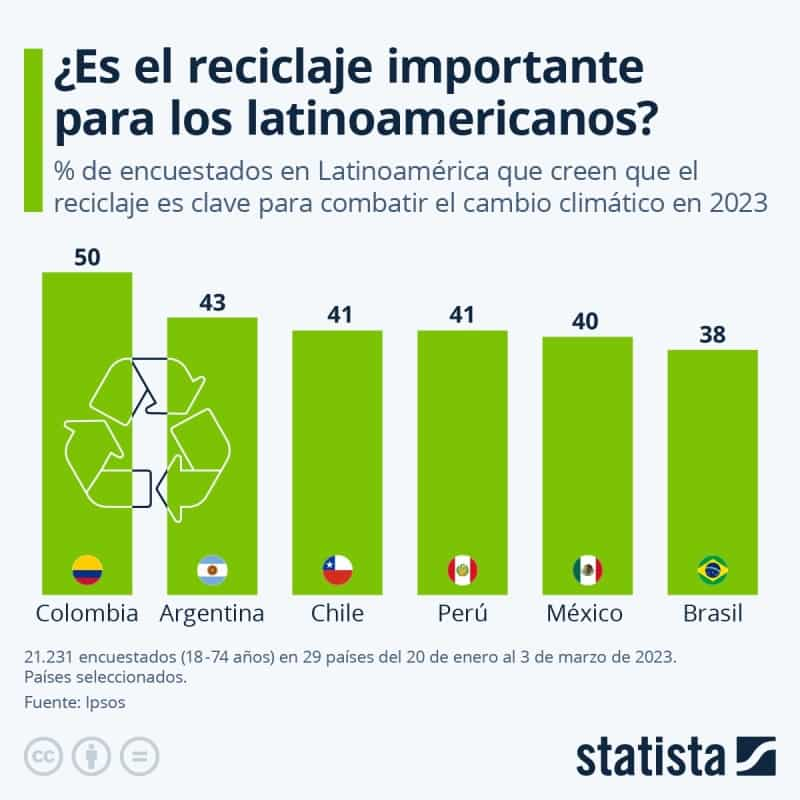Waste pollution has become one of the most pressing global concerns, and Latin America is no exception. With increasing urbanization and consumerism, the region faces significant challenges in managing its waste effectively. One of the most common approaches to tackling this issue is through recycling and waste separation. However, in Latin America, this practice is not as widely adopted among the population as in other parts of the world.
Recycling in Latin America: A Snapshot
According to a recent survey by Ipsos, less than 50% of Latin Americans consider recycling a key measure to combat climate change. Despite growing awareness of environmental issues, recycling remains a secondary priority for many people in the region. Among the countries surveyed, Colombia, Argentina, Peru, and Chile stood out as nations where the population places higher importance on waste separation and recycling practices. Mexico ranks fifth, surpassing Brazil in waste recycling efforts. This position highlights Mexico’s growing awareness and participation in sustainable practices, but also underscores the need for more widespread adoption of recycling initiatives.
The Importance of Recycling in Latin America
In 2022 alone, Latin America and the Caribbean generated over 2,000 million tons of waste, including both organic and inorganic materials. While this figure is lower than those of highly industrialized nations such as China or the United States, recycling rates in Latin America remain below the global average. This disparity emphasizes the urgent need for improved waste management systems and policies to encourage recycling at both individual and industrial levels.
Bolivia and Colombia led the region in recycling capabilities in 2023, with recycling rates of 34.4% and 28.5%, respectively, according to Yale University’s Environmental Performance Index. These figures demonstrate that while progress is being made, there is still significant room for improvement across the region, including in Mexico.
Mexico’s Role in the Regional Recycling Movement
Mexico’s fifth-place ranking in recycling efforts reflects a positive trend in environmental awareness and action. The country has made strides in implementing policies and initiatives aimed at promoting a circular economy, where materials are reused and recycled to minimize waste. For instance, Tabasco is set to establish a new recycling plant designed to boost the circular economy and reduce environmental impact. Such projects are vital for addressing waste management challenges and setting an example for other regions.
Despite these advancements, Mexico still faces obstacles in making recycling a widespread practice. Cultural habits, lack of infrastructure, and insufficient public awareness campaigns are some of the barriers to achieving higher recycling rates. Overcoming these challenges requires a multifaceted approach involving government action, private sector participation, and community engagement.
Benefits of Recycling for Mexico and LATAM
Recycling offers numerous benefits that extend beyond waste reduction. For Mexico and the broader Latin American region, recycling can:
- Mitigate Environmental Impact: Recycling reduces the need for raw material extraction, decreasing deforestation, water usage, and energy consumption.
- Combat Climate Change: Proper waste management, including recycling, reduces greenhouse gas emissions by diverting waste from landfills and promoting the reuse of materials.
- Boost the Economy: Recycling initiatives can create jobs in waste collection, sorting, and processing, contributing to local economic growth.
- Promote Public Health: Proper disposal and recycling of waste reduce pollution, leading to cleaner air and water and improved public health.
Challenges to Overcome
While recycling holds great potential, several challenges hinder its widespread adoption in Mexico and Latin America:
- Limited Infrastructure: Many areas lack adequate recycling facilities and waste collection systems.
- Public Awareness: Educating the population about the importance of recycling and how to do it effectively remains a significant challenge.
- Economic Barriers: High costs associated with recycling processes can deter both governments and private companies from investing in sustainable solutions.
- Informal Recycling Sector: In many Latin American countries, informal recyclers play a crucial role in waste management but often lack proper support and recognition.
The Way Forward
To enhance recycling rates and promote sustainable waste management, Mexico and its Latin American neighbors must take coordinated action. Key strategies include:
- Investing in Infrastructure: Building more recycling plants and improving waste collection systems will make it easier for people to participate in recycling.
- Raising Awareness: Public education campaigns highlighting the environmental and economic benefits of recycling can encourage behavioral change.
- Supporting Innovation: Encouraging research and development of new recycling technologies can make processes more efficient and cost-effective.
- Collaborating with the Informal Sector: Integrating informal recyclers into formal systems can improve efficiency and provide them with better working conditions.
Mexico’s position as the fifth-leading country in recycling in Latin America is a testament to its growing commitment to environmental sustainability. However, there is still much work to be done to ensure that recycling becomes a widespread practice across the nation and the region. By investing in infrastructure, fostering public awareness, and promoting a circular economy, Mexico can not only improve its recycling rates but also set an example for its neighbors in Latin America. With collective effort, the region can address its waste management challenges and contribute to a more sustainable future.

